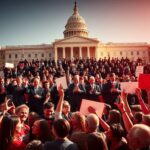President Donald Trump is changing U.S. foreign policy. Secretary of State Marco Rubio now holds two important national security roles.
This change shows a big shift for Rubio. He used to be a Trump critic. Now, he’s a key player in the administration.
This is a key moment in U.S. politics. Rubio’s experience and knowledge are helping shape the country’s foreign policy.
Key Takeaways
- Marco Rubio has taken on a dual role in the Trump administration.
- Rubio’s new position impacts U.S. foreign policy significantly.
- The shift from critic to key figure marks a new era in U.S. politics.
- Rubio’s experience is key in shaping the country’s national security.
- The implications of Rubio’s dual role are far-reaching.
The Announcement: Rubio’s Nomination for Dual Cabinet Positions
The Trump administration made a big surprise by naming Marco Rubio for two key cabinet roles. Rubio’s new job is expected to greatly impact U.S. foreign policy and national security.
Details of Trump’s Announcement
Trump named Rubio to replace Mike Waltz as national security adviser. This is a big change for the administration’s foreign policy and national security.
Rubio’s growing influence in the administration was highlighted. His new role also shows he’s more in line with Trump’s goals. Rubio will face bipartisan scrutiny from lawmakers.
Unprecedented Nature of the Combined Role
Making Rubio Secretary of State and National Security Adviser is a first. It has sparked a lot of debate. Rubio now has a lot of power to shape the administration’s policies.
- Rubio’s dual role means he’ll handle complex diplomatic and security issues.
- There are worries about too much power and possible conflicts of interest.
- As national security adviser, Rubio will help the Trump administration tackle global security problems.
Initial Reactions from Washington
Lawmakers in Washington have had different reactions to Rubio’s nomination. Some support him, while others have concerns.
The Trump administration will face a lot of scrutiny with Rubio’s nomination. Rubio’s success will depend on how well he handles his new role and works with others.
Marco Rubio’s Political Journey
Marco Rubio started in Florida politics and grew into a national leader. His journey shows his smart moves and policy work.
Rise in Florida Politics
Rubio first entered politics in Florida. He was a West Miami City Commissioner and later a Florida House Representative. His time in the Florida Legislature was filled with important work.
He made a big impact on education reform in Florida. Rubio’s work in this area changed Florida’s education policies. It showed his power to make a difference.
Presidential Campaign Ambitions
In the 2016 Republican primaries, Rubio showed he wanted to be President. He stood strong on issues like immigration and foreign policy.
Even when called “Little Marco” by Donald Trump, Rubio kept going. He showed he could handle tough times.
Senate Career Highlights
As a U.S. Senator, Rubio worked on important committees. His time on the Foreign Relations Committee was key.
Foreign Relations Committee Experience
Rubio’s work on the Foreign Relations Committee helped shape U.S. foreign policy. He talked about big global issues like U.S.-Cuba relations and counter-terrorism strategies.
- Pushed for a strong U.S. role in world affairs
- Supported efforts to counter Iranian power
- Helped shape U.S. policy in Latin America
Legislative Achievements
Rubio helped pass many important laws. His work shows his focus on national security, economic growth, and social issues.
- Backed laws to improve cybersecurity
- Supported changes to the U.S. immigration system
- Pushed for laws against human trafficking
The Evolution of Rubio’s Relationship with Trump
Rubio and Trump started as rivals but now work together. Rubio was once a strong critic of Trump. Now, he supports many of Trump’s ideas.
2016 Campaign Rivalry and “Little Marco” Era
In the 2016 primary, Rubio challenged Trump. Trump called him “Little Marco.” This rivalry was fierce, with both sides criticizing each other.
Key moments from this era include:
- Rubio’s strong performance in the early debates
- Trump’s relentless attacks on Rubio’s effectiveness as a senator
- Rubio’s eventual suspension of his campaign
Notable Criticisms of Trump’s Foreign Policy
Rubio was critical of Trump’s foreign policy at first. He worried about Trump’s approach to alliances and trade.
Some of Rubio’s criticisms included:
- Opposition to Trump’s decision to withdraw from the Iran nuclear deal
- Criticism of Trump’s approach to North Korea
- Concerns over Trump’s trade policies and their impact on global stability
Gradual Alignment with Trump’s Agenda
Rubio has started to support many of Trump’s policies. This change is seen in his votes and public words.
Key Votes Supporting Trump Initiatives
Rubio has backed several Trump initiatives. These include:
- Confirmation of key cabinet members
- Legislation aimed at reforming tax policies
- Support for certain foreign policy initiatives, like moving the U.S. embassy to Jerusalem
Public Statements Showing Evolving Support
Rubio’s words have shown his growing support for Trump. He has praised Trump’s policies on China and fighting terrorism.
Rubio’s journey from a trump critic to a key ally is clear. His rise in the cabinet shows his ability to adapt and succeed politically.
Marco Rubio’s Dual Role From Trump Critic to Secretary of State and National Security Adviser: A Political Transformation
Marco Rubio has moved from being a Trump critic to possibly becoming Secretary of State and National Security Adviser. This change is more than just a job switch. It shows Rubio’s new support for Trump’s foreign policy.

Key Turning Points in Rubio’s Stance Toward Trump
Rubio’s path to these roles has seen major changes. He was once critical of Trump during the 2016 campaign. But now, he shares many of Trump’s views on foreign policy.
A key moment was when Rubio backed Trump’s “America First” policy. This move was important for Rubio’s chance at the dual role. It showed he’s ready to work with the administration.
Policy Areas of Agreement
Rubio has shown he agrees with Trump on many issues. Some of these include:
- Trade Policies: Rubio supports Trump’s trade policies to protect American jobs.
- National Security: He agrees with Trump on making national security stronger.
- Foreign Policy: Rubio’s views on China, for example, match Trump’s.
Remaining Ideological Differences
Even with their agreements, Rubio and Trump have differences. These could affect Rubio’s role in the administration.
Where Rubio May Influence Trump’s Positions
Rubio’s foreign policy knowledge might shape Trump’s views. His diplomacy skills could balance Trump’s more extreme ideas.
Potential Areas of Tension
Rubio and Trump might disagree on some things. Rubio’s traditional views could clash with Trump’s unconventional methods.
In summary, Rubio’s new role is a big change. It shows he’s now a key player in Trump’s foreign policy team. How well he does will depend on his ability to handle both agreements and disagreements with Trump.
Historical Context and Precedent for the Combined Position
Marco Rubio’s nomination for Secretary of State and National Security Adviser is a big deal. It brings to mind a significant historical figure. This move could change U.S. foreign policy a lot. To grasp its impact, we need to look at the past and what has come before.
Previous Secretaries of State
The Secretary of State has always been key in shaping U.S. foreign policy. Famous ones include Henry Kissinger and Condoleezza Rice. They helped define America’s role in the world.
History of the National Security Adviser Role
The National Security Adviser is a top advisor to the President on security issues. Over time, this role has changed. Some have been more public, while others have worked behind the scenes.
Past Instances of Concentrated Foreign Policy Authority
Some people have had a lot of power over foreign policy. This is often because they’re close to the President or have a key role in the administration. A great example is Henry Kissinger, who was both Secretary of State and National Security Adviser.
Henry Kissinger’s Influence
Henry Kissinger’s dual role under Nixon and Ford is a big precedent for Rubio. Kissinger’s impact on U.S. foreign policy during the Cold War was huge. His legacy is widely studied and debated.
Modern Separation of Powers
Today, the Secretary of State and National Security Adviser have different jobs. This setup is meant to balance foreign policy decisions. But, having one person in charge, like Kissinger, can greatly influence policy.
Looking at history helps us understand what Rubio’s dual role might mean. As the Trump administration faces global challenges, knowing these precedents is key.
- The combined role of Secretary of State and National Security Adviser is rare and historically significant.
- Henry Kissinger’s dual role under Nixon and Ford serves as a key precedent.
- The modern separation of powers between the Secretary of State and National Security Adviser reflects a deliberate design to balance foreign policy decision-making.
Rubio’s Foreign Policy Doctrine
Rubio’s foreign policy is complex and detailed. It’s shaped by his Senate work and his ties with the Trump administration.
Stance on China and Indo-Pacific Strategy
Rubio wants a strong strategy against China in the Indo-Pacific. He believes in strengthening alliances and partnerships to keep the area stable and secure.
- He stresses the need for a free and open Indo-Pacific.
- He supports more military presence and cooperation.
- He also backs economic engagement and trade agreements.
Approach to Russia and Eastern Europe
Rubio is firm on security issues, focusing on Eastern Europe. He backs NATO’s eastern flank reinforcement and efforts to counter Russian influence.
His key points include:
- Keeping a strong NATO presence in Eastern Europe.
- Boosting cybersecurity to fight Russian aggression.
- Supporting Ukraine and other Eastern European allies.
Middle East and Israel Relations
In the Middle East, Rubio aims to keep a strong bond with Israel. He supports robust security cooperation with Israel and works on the Israeli-Palestinian conflict.
Latin America Policy and Venezuela
Rubio’s Latin America policy focuses on Venezuela. He pushes for sanctions against the Maduro regime and supports democratic change.
Cuba Policy Specifics
On Cuba, Rubio is cautious. He wants human rights improvements and democratic reforms before engaging further.
Border and Immigration Positions
Rubio has worked on deals to send immigrants accused of crimes to third countries, like El Salvador. This is part of his broader immigration strategy.
Rubio’s foreign policy has big implications. It could affect global stability, regional security, and the U.S. role in international affairs.
Bipartisan Scrutiny and Confirmation Process
Rubio’s nomination for Secretary of State and National Security Adviser has sparked bipartisan scrutiny. This sets the stage for a contentious confirmation process. As Rubio faces the Senate, his dual role is expected to draw intense examination from lawmakers on both sides of the aisle.
Democratic Opposition Points
Democrats are likely to scrutinize Rubio’s past criticisms of Trump’s policies and his subsequent alignment with the administration. Key areas of contention may include Rubio’s stance on issues such as immigration, healthcare, and foreign policy.
Some Democrats may also question Rubio’s ability to serve in a dual capacity. They may cite concerns about the concentration of power and possible conflicts of interest.
Republican Support and Concerns
Republicans are likely to support Rubio’s nomination, given his party affiliation and past loyalty to Trump’s agenda. Yet, some GOP lawmakers may express concerns about Rubio’s previous criticisms of Trump. They may also question his ability to navigate the complexities of the dual role.
Some Republicans may also question whether Rubio’s appointment represents a significant political shift for the Trump administration. They may see it as a sign of a more pragmatic approach to foreign policy.
Confirmation Timeline and Possible Hurdles
The confirmation process is expected to be lengthy. Several key Senate committees will review Rubio’s nomination. Opposition from Democratic lawmakers and possible Republican dissenters could pose hurdles.
Key Senate Committee Players
The Senate Foreign Relations Committee and the Senate Armed Services Committee are likely to play critical roles in Rubio’s confirmation process. Committee chairs and ranking members will have significant influence over the proceedings.
Likely Confirmation Hearing Focus Areas
During the confirmation hearings, Rubio is likely to face questions on a range of topics. These include his foreign policy doctrine, his approach to key global challenges, and his ability to navigate the complexities of the dual role.
Rubio’s responses will be closely watched. They will provide insight into his policy priorities and his approach to the cabinet rise.
MAGA Consolidation: Rubio’s Place in Trump’s New Cabinet
Rubio’s move to two roles in Trump’s cabinet shows the MAGA consolidation in action. As Trump’s team grows, Rubio’s jobs as Secretary of State and National Security Adviser mark a big change. This change is key for the Republican leadership’s plans.

Other Key Trump Administration Appointments
The Trump administration is changing a lot, with many important appointments. Rubio is not alone in getting a big role. Others are coming in who share Trump’s MAGA agenda.
These new faces are important for seeing where Trump’s team is headed, mainly in foreign policy and national security. The ideological alignment among them will shape the administration’s strategy.
Ideological Alignment Among Cabinet Members
The Trump team sticks to the MAGA doctrine closely. Rubio’s two jobs are a big part of this, bringing power together. The agreement on key issues among cabinet members is key for Trump’s policy success.
Power Centers in the New Administration
As Trump’s team forms, several power centers are emerging. Rubio’s dual role is at the heart of this, affecting his relationship with the Vice President and coordination with the Defense Department.
Relationship with Vice President
The bond between Rubio and the Vice President is vital for foreign policy and national security. A strong partnership will help in making decisions in these areas.
Coordination with Defense Department
Rubio’s job as National Security Adviser means working closely with the Defense Department. This teamwork is key for the success of the national security strategy.
As the administration gets stronger, Rubio’s roles will play a big part in U.S. foreign policy and national security. The next few months will show how well these efforts do.
Global Reactions to Rubio’s Nomination
The news of Marco Rubio’s possible dual appointment has caused a stir worldwide. International players and stakeholders have given varied responses. As the world considers Rubio’s dual role, different regions and countries share their views.
Responses from NATO and European Allies
NATO and European allies have mixed feelings about Rubio’s nomination. They welcome a strong U.S. presence globally. Yet, they worry about a more assertive U.S. foreign policy under Rubio.
- Some European leaders hope Rubio’s experience will improve transatlantic relations.
- Others are cautious due to Rubio’s past criticisms of Trump administration policies.
Asian Partners’ Perspectives
Asian partners, like Japan and South Korea, are watching closely. They’re interested in how Rubio’s dual role might shape U.S. policy in the Indo-Pacific.
Key considerations include:
- They wonder if there will be more diplomatic and military engagement in the region.
- They’re concerned about the impact on regional security arrangements.
Reactions from Russia, China, and Iran
Adversaries like Russia, China, and Iran are skeptical and concerned. They see Rubio’s nomination as a challenge to their interests.
- Russia is wary of Rubio’s views on Eastern Europe and NATO expansion.
- China is concerned about Rubio’s hawkish stance on Chinese affairs.
- Iran fears Rubio’s hardline stance on Middle Eastern issues.
Latin American Responses
Latin American countries are also reacting to Rubio’s nomination. His influence on U.S. policy towards the region is significant. Countries like Venezuela, Cuba, and Nicaragua are sensitive to U.S. policy changes.
The region’s reactions range from hope for better relations to fear of U.S. intervention.
Implications for U.S. Foreign Policy Direction
Rubio’s leadership in both roles will deeply affect U.S. foreign policy. As Secretary of State and National Security Adviser, he will have a big say in international relations and security plans.
Potential Shifts in Diplomatic Approach
Rubio’s dual role could lead to a more unified U.S. diplomacy. He will control both diplomatic efforts and national security advice. This might make U.S. foreign policy more consistent and effective.
- Enhanced coordination between diplomatic and security agencies
- A more assertive U.S. presence on the global stage
- Potential for renewed diplomatic efforts in regions of conflict
National Security Strategy Changes
As National Security Adviser, Rubio will shape U.S. national security strategy. This might include:
- Revising existing security protocols to address emerging threats
- Strengthening alliances and partnerships to counter global challenges
- Developing new strategies to address the rise of China and other geopolitical shifts
A strong national security strategy needs a full approach, combining diplomacy, military, and economic efforts. This integrated approach is likely to be a hallmark of Rubio’s tenure as National Security Adviser.
Economic and Trade Policy Outlook
Rubio’s influence will also touch economic and trade policy, key to U.S. foreign policy. As Secretary of State, he will help negotiate trade agreements and shape U.S. economic diplomacy.
Potential New Trade Agreements
The U.S. might seek new trade agreements under Rubio’s guidance. This could include:
- Strengthening existing trade relationships
- Exploring new markets for U.S. goods and services
- Addressing trade imbalances and unfair trade practices
Sanctions Policy Direction
Rubio’s role will also shape U.S. sanctions policy. This could lead to:
- A more targeted approach to sanctions, focusing on specific individuals or entities
- Increased coordination with international partners on sanctions
- A review of existing sanctions to assess their effectiveness
The implications of Rubio’s dual role for U.S. foreign policy are far-reaching and complex. As the U.S. faces a tough global landscape, Rubio’s leadership will be key in shaping diplomatic, security, and economic strategies.
Conclusion: The Road Ahead for Rubio and American Diplomacy
Marco Rubio is set to play a big role in U.S. foreign policy. He might become both Secretary of State and National Security Adviser. This change could greatly impact how America deals with the world.
Rubio’s views on key issues like China, Russia, and the Middle East will guide his actions. His foreign policy plans might change how the U.S. interacts with other countries. This could lead to new strategies in national security.
Rubio’s appointment will be closely watched by everyone. The confirmation process will show if he’s ready for this big job. If he succeeds, he’ll help shape America’s role in the world.
How Does Marco Rubio’s Role Influence National Security Policies Under Trump’s Administration?
Marco Rubio’s role in shaping national security policies during Trump’s administration was crucial. His strategic insights and advocacy for a robust stance against adversaries allowed him to influence decisions significantly. The collaboration with key figures like musk and trump reshape national security, emphasizing innovation and defense in an evolving global landscape.
FAQ
What is Marco Rubio’s dual role in the Trump administration?
Marco Rubio has been nominated for two big roles. He will be Secretary of State and National Security Adviser. This is a big deal for the Trump administration’s foreign policy.
How did Rubio’s relationship with Trump evolve over time?
Rubio and Trump started as rivals in 2016. But they have grown closer over time. Rubio now supports Trump’s foreign policy, despite initial doubts.
What are the implications of Rubio’s dual role for U.S. foreign policy?
Rubio’s roles could change how the U.S. deals with the world. There might be new diplomatic approaches and security strategies. We could also see new trade deals and sanctions.
What is Rubio’s stance on key foreign policy issues?
Rubio is tough on China, Russia, and Eastern Europe. He has clear views on the Middle East, Israel, Latin America, and Venezuela. These views shape his foreign policy.
How has the international community reacted to Rubio’s nomination?
The world is watching Rubio’s nomination closely. NATO, European allies, and others have shown interest and concern. Russia, China, Iran, and Latin America are also paying attention.
What are the potentially tense or influential areas in Rubio’s dual role?
Rubio could influence Trump’s foreign policy views. But, there might be disagreements with Trump. He also needs to work well with other cabinet members.
What is the significance of Rubio’s dual role in the context of the MAGA consolidation?
Rubio’s appointment is part of the MAGA movement in the Trump administration. Other key appointments and ideological alignment are shaping the administration’s agenda.
What are the next steps in Rubio’s confirmation process?
Rubio will face scrutiny and a confirmation process. Democrats will have points of opposition, while Republicans will support him. The timeline will depend on Senate committee players and hearings.
How does Rubio’s experience on the Foreign Relations Committee relate to his new roles?
Rubio’s experience on the Foreign Relations Committee is valuable. It has given him insight and expertise. This experience will shape his approach as Secretary of State and National Security Adviser.
What are the historical precedents for Rubio’s combined role?
Rubio’s combined role has precedents, like Henry Kissinger’s influence. The modern separation of powers also provides context for his dual role.









































































































